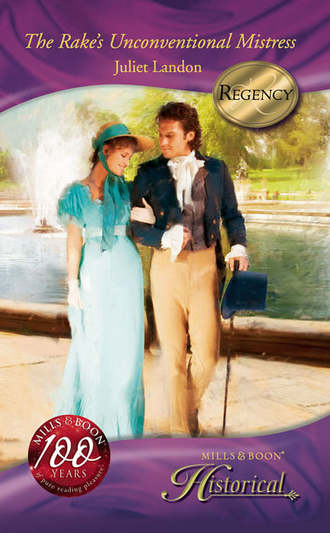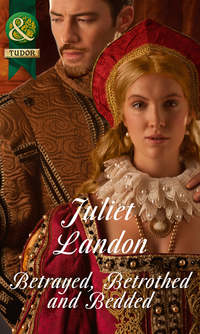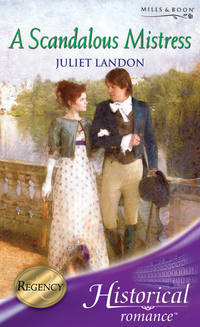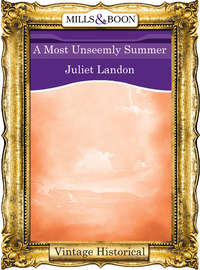
Полная версия
The Rake's Unconventional Mistress
‘I’m not exactly blind, my lord.’
‘So defensive,’ he said, crooking his arm for her. ‘Come on. Mind that branch.’
She hesitated, unaware of any obstruction on the path. It was shadowed and dappled with greenery, and it would be unnecessarily foolish to ignore his offer of help, and she was defensive, and insecure, and a whole lot of other devices acquired during years of having to battle against convention, her mother, her desires, her poor eyesight and its disadvantages. Her hesitation was interpreted as obstinacy.
‘Can you not bring yourself to accept help of any kind?’
‘I can’t see any branch!’ she yelped.
Unable to stifle a chuckle of exasperation, he went behind her, bending to unlatch the skirt of her sage-green habit from a mossy twig projecting from a branch. ‘Now,’ he said, offering his arm again, ‘shall we go, or shall you fight the elements single-handed?’
Subdued, she took his arm and used his steely strength to negotiate the overgrown path up to the house, unsure how she had come to this point in a relationship that could not have begun in a worse manner. She understood that everyone had at least two sides to their characters, but so far she had allowed him to see only one of hers. It was her own bizarre twosidedness that concerned her most, for she was not sure which of the two was the real Lettie Boyce, nor did she approve of the deception she was being forced to present, especially to those close to her. For some reason she could not explain, it mattered to her that this man’s opinion should be placed on a firmer footing.
‘Lord Rayne,’ she ventured, not quite knowing what to say.
‘Miss Boyce?’
‘You may have…well, you see…I am not quite what you think.’
‘And you are about to tell me what I think, are you? I thought we had agreed on the absurdity of that, just now.’
‘I meant to say, if you will allow me, that I may have given you the impression that…well, you spoke earlier about my sharp tongue, and—’
‘And the fact that you might personally benefit from a little schooling? Yes, I remember, Miss Boyce. Are you taking up my offer, then?’
‘Lord Rayne, you are the most odious man of my acquaintance.’
‘Abominable,’ he agreed, smiling broadly.
Chapter Four
As a result of her meeting with Miss Austen Letitia came away with a feeling of relief that she had not revealed anything of her own writing. Yet with every sentence she wrote, she was reminded that, apart from one derisory kiss from the odious Lord Rayne, her heroine and her heroine’s creator were both still innocents with fervent imaginations. Although the kiss was very clear in her memory, it had not been given in the right circumstances and was therefore untypical.
Mr Waverley had told her that afternoon how much he was enjoying Waynethorpe Manor as much as, if not more than, the first novel. His mother, he told her, had begged to be the next to read it.
‘Is that wise?’ Letitia asked him before he left that evening.
‘She’s one of your most avid readers. Of course it’s wise.’
‘I hope she doesn’t suspect…’
He took her by the shoulders in brotherly fashion, laughing at her touchiness. ‘She doesn’t suspect anything, Lettie. She and Lake are well acquainted, and he’s told her that the author is a certain Lydia Barlowe, but no more than that.’
‘Perhaps I should have used different initials.’
‘Nonsense. No one is ever going to make the connection.’
Her friend’s approval of Waynethorpe Manor, however, satisfied her that the author’s lack of emotional experience had not in any way affected his enjoyment, though whether she could convince her readers for a third time remained to be seen.
‘What’s the new one about?’ he asked.
‘About a young lady called Em…er…Perdita, rather like one of my pupils, in some ways.’
‘Which pupil?’
‘Any one of them. Inexperienced. Looking for excitement.’
‘Looking for love, you mean.’
‘Yes, that, too,’ she said, giving herself away at each reply. Surely Bart would recognise the heroine?
‘You have only to look at the material right under your roof.’
‘What d’ye mean?’ she asked, rather too sharply.
‘I mean your seven young ladies, who else?’ They had reached the pavement where Mr Waverley’s horse was being held by the young groom. Taking the reins with a nod of thanks, he spoke to Letitia in a confidential whisper. ‘As a matter of fact, there is a young lady who might fit your Perdita’s description, up to a point. The lass from Scotland. One of the boarders.’
‘Edina Strachan? In what way?’
‘Nothing I can quite put my finger on, but you must have noticed how inattentive she’s become this new term. Her mind certainly isn’t on her household-management accounts, and I’d swear she’d been weeping before she came to the dinner table yesterday. She moons about like a lovesick calf.’
‘You don’t think she might be in love with you, do you, Bart?’
‘Good grief, no, I do not. She’s either still homesick or lovesick, I tell you. Perhaps something happened while she was at home at Easter. You might keep an eye on the situation.’
‘Yes, thank you for the warning. I will. I’ll ask Mrs Quayle what she knows about it.’
But Mrs Quayle, the widow in whose house next door the three boarders had rooms, had nothing to add to Mr Waverley’s observations. ‘Homesickness, my dear,’ she said that evening. ‘It’s only her second term away from home. We may have to work harder on her Scottish lilt, for if she cannot be understood, she’s not going to make much headway in the marriage mart, is she? Perhaps we could get Mr Thomas to give her an extra half-hour each week?’
‘So you don’t think she’s in love?’
‘Who knows? With all those young Hussars swarming about, it wouldn’t surprise me if all seven of them were. Don’t worry, I’ll keep a look out.’
‘Yes. Thank you.’
That same evening, Letitia sat with the attractive seventeen-year-old Edina, whose guardian grandparents lived at Guildford. After talking at length about her family, it seemed that Edina was relieved to be away from their strait-laced Presbyterian influence and more involved with the kind of social life she had previously been denied. The symptoms that Mr Waverley had identified could not be homesickness, Letitia decided, therefore it must be love.
That evening, Edina’s early signs were written into the notebook with some elaboration to make up for what Letitia had not personally observed.
* * *
The remainder of the week passed uneventfully except for the visit on Thursday of Miss Garnet and Miss Persephone Boyce in the company of Uncle Aspinall and Aunt Minnie, the latter requiring a tour of the house and redesigned gardens. Sir Penfold Aspinall, a bluff, good-natured giant who had done so much to help his sister’s eldest daughter to set up house, approved of everything he saw, partly because he trusted her good taste and partly because he liked the idea of being surrogate father to his remarkable niece. His wife, shrewish and disapproving, had come chiefly to take note and then to convey to Lady Boyce every detail to which they could mutually object.
The twins’ main purpose in visiting their sister seemed to be to catch sight of Lord Rayne, whose absence had been the cause of some concern. They asked if it was true that he was visiting her.
‘Visiting me? You must be bamming!’
‘Has he?’
‘Of course not. Why would he visit me?’
‘We heard he was riding with you on Monday.’
‘Me and about twenty others on the way to Garrick’s Temple.’
‘Oh, well, if that’s all.’
‘That is all. I suppose he’ll be escorting you on Saturday?’
‘No,’ said Persephone, pouting.
‘Too busy with preparations for the foreign visitors. Apparently they’ll all need mounts,’ said Garnet. ‘We shall go to Almack’s, anyway.’
‘It won’t be the same. He’s such a tease.’
‘Is he?’ said Letitia, relieved to hear that his commitments would keep him away from Richmond that weekend. ‘Come to the garden and see my new summer-house. I think you’ll like it.’
Aunt Minnie had found it first. She was taking tea there, dunking an almond biscuit in her cup before she heard them coming. ‘Ridiculous waste of money, Letitia,’ she said, brushing away dribbles of tea from her lace tippets. ‘What are your fees for this place?’
‘With extras, usually twenty pounds a term. More for the boarders.’
‘Hmm! I don’t know what your mama will say to that.’
Uncle Aspinall chuckled. ‘It has nothing to do with Euphemia,’ he said. ‘Cheap at the price, I’d say. What are your young ladies doing now, Letitia?’
‘French, with Madame du Plessis, Uncle.’
‘Tch! French indeed,’ said Aunt Minnie, sourly. ‘That monster Bonaparte has a lot to answer for.’
But Uncle Aspinall had nothing but compliments to offer about the way his niece had furnished the rooms, the feminine colour schemes, the new garden layout and the adjoining conservatory. The hanging baskets, potted palms, window-boxes and newly planted vines had brought the garden well into the white painted room. ‘Like a jungle!’ Aunt Minnie carped. ‘Ridiculous!’
It was not until Saturday evening when Letitia gathered her pupils into the downstairs parlour for a last check that she discovered an unwanted addition to the guest list that she could do nothing about when the invitation had been issued by Miss Sapphire Melborough, the daughter of their hosts.
Letitia kept her annoyance to herself, though she would like to have boxed the pert young woman’s ears. ‘I don’t mind you inviting Lord Rayne, Sapphire dear,’ she said, fastening the pearl pendant behind her neck, ‘but it might have been more polite if you’d asked me first. And your parents. We have to be very careful about the audience, you know.’
‘But they like Lord Rayne,’ said Sapphire, understating the case by a mile, ‘so I know they won’t mind him coming with Lord and Lady Elyot. And I didn’t think you’d disapprove, now that you and he have made up your differences. I told him about our concert and he said he’d like to hear me sing.’
‘Next time, dear,’ said Letitia, turning Sapphire to face her, ‘ask me first, will you? He may be one of Richmond’s haut ton, but the 10th Light Dragoons, or Hussars, whichever you prefer, have quite a reputation.’
Sapphire’s bright cornflower eyes lit up like those of a mischievous elf. ‘The Elegant Extracts is what I prefer, Miss Boyce. It’s so fitting, isn’t it?’
‘It’s also one of the more repeatable tags. There now, let me look at you. Yes, I think your family will be proud of you. Nervous?’
A hand went up to tweak at a fair curl, and the eyes twinkled again. ‘With Lord Rayne watching me, yes.’ Provocatively, she lifted one almost bare shoulder in a way that some women do by instinct. It would only be a matter of time, Letitia thought, before this one and her parents managed to snare the Elegant Extract, unless one of her own sisters did first.
‘Stay close to Edina, Sapphire. I think she feels the absence of her parents and guardians at a time like this.’
‘Yes, Miss Boyce. Of course I will.’
There was more to Letitia’s annoyance than having to show friendship to a man she would rather have avoided. He had told her sisters that he would be too busy on Saturday to escort them when he must already have accepted Sapphire’s invitation to hear her sing. Persephone and Garnet would be sadly out of countenance to learn that he was not as committed to them as they thought. Their mother even more so. All that was needed now to set the cat among the pigeons was for them to believe that she had invited him to the Melboroughs’. She could only pray that they would not come to that conclusion as easily as they’d learned of his precise whereabouts on Monday.
As it transpired, this particular problem faded into insignificance beside the others of that evening. Though she had made every effort to present her pupils to perfection in appearance, manners and performance, the one who outshone them all without the slightest effort was herself. Gowned modestly in palest oyster silk and ivory lace, her aristocratic breeding and her refined silvery loveliness drew the eyes of the appreciative audience before, during and after each individual contribution. Making good use of her gold enamelled scissors-spectacles that hung from a ribbon looped about her wrist, she was able to see most of what was happening while combining an image of seriousness with a charming eccentricity, for the folding spectacle was not an easy accessory to use.
When she was not using it, it seemed hardly to matter that she could see only the indistinct shapes of the guests for, with Mr Waverley to help her through introductions and to murmur reminders in her ear, she felt the disadvantage less than she might otherwise have done. It also quite escaped her notice that the admiring eyes of so many men turned her way, or that the women’s eyes busied themselves with every perfect detail of her ensemble.
Miss Gaddestone, petite in a flurry of frills, mauve muslin and bugle beads, and Mrs Quayle, like a plump beady-eyed brown bird, were the other two who knew the seriousness of Letitia’s handicap, but who were too interested in their own roles to play chaperon to her as well as the pupils. They knew Mr Waverley would do that.
Sir Francis and Lady Melborough had taken a fancy to Letitia from the start, looking upon her at times as one of the family, though it had always been one of her policies to maintain a respectful distance between herself and the pupils’ parents to avoid any appearance of favouritism. Lady Melborough was a perfect forecast of how Sapphire would look in another twenty years, kindly and flighty and of a more blue-blooded ancestry than Sir Francis. She had prepared well for this event, her house being the most perfect setting, high-ceilinged and spacious, gold-and-white walled, moulded and mirrored.
As a newly knighted city banker, Sir Francis was self-important and ambitious, handsome and middle-aged with an eye for the feminine form, and for his own form, too. He stood facing a very large gilded mirror to speak to Letitia where, with lingering looks, he could see over her shoulder both his own front and her back, the curve of which he thought was enchanting. Letitia found his closeness uncomfortable, his affability fulsome, his attentions too personal for politeness. She edged away, trying to identify Mr Waverley’s brown hair amongst so many others, and when she noticed the unmistakable frame and dark head of Lord Rayne approaching from across the room, the sudden relief she felt was quite impossible to hide.
‘Why, Miss Boyce,’ he said, ‘am I dreaming, or did I see a fleeting welcome in your smile? Do tell me I’m not mistaken.’
‘It would be impolite of me, to say the least, Lord Rayne, to admit any feeling of relief. Sir Francis is our host and I’m sure he’s doing all he can to make the evening a success.’
‘Then I take it you would not appreciate a word of warning?’
This was the first time she had seen Lord Rayne in evening dress, and she found it difficult to reconcile the former soldier in regimentals with the quietly dressed beau in charcoal-grey tail-coat, left open to show a waistcoat of grey silk brocade. Whatever else she disliked about him, she could not fault his style. ‘Warning?’ she said. ‘Are you the right person to be warning me of that?’
‘Of what, Miss Boyce?’
‘Lord Rayne, you take a delight in putting me to the blush. But I shall not rise to your bait. You of all people must know what I refer to.’
‘Will I never be forgiven for that, Miss Boyce? Am I not to be allowed to warn you of similar dangers from old married men who ought to know better?’ Despite the teasing words, his eyes were seriously intent.
‘It is not necessary. I am not a green girl, my lord, and I have Mr Waverley to protect me.’
Конец ознакомительного фрагмента.
Текст предоставлен ООО «ЛитРес».
Прочитайте эту книгу целиком, купив полную легальную версию на ЛитРес.
Безопасно оплатить книгу можно банковской картой Visa, MasterCard, Maestro, со счета мобильного телефона, с платежного терминала, в салоне МТС или Связной, через PayPal, WebMoney, Яндекс.Деньги, QIWI Кошелек, бонусными картами или другим удобным Вам способом.








